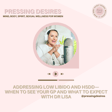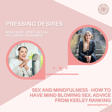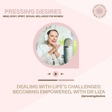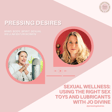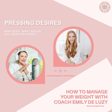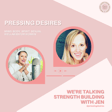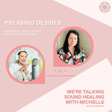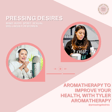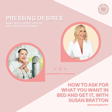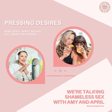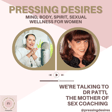Introduction to Pressing Desires Podcast
00:00:03
Speaker
Welcome to Pressing Desires, the podcast exclusively for women wanting to improve their health by unlocking their mind, body, spirit and sexual wellness.
00:00:19
Speaker
Join us on this transformative journey as we explore topics that touch your soul, invigorate your body, and reignite your passions. From cultivating a resilient mindset, nourishing your physical health, awakening your spirit, and embracing your deepest desires, nothing is off limits.
Goals and Resources of the Podcast
00:00:45
Speaker
Pressing desires is your go-to resource, featuring expert interviews, inspiring stories of triumph, and practical tips to help you unlock your true potential. Subscribe now, and together, let's embrace our pressing desires and create a life that exceeds all expectations.
00:01:07
Speaker
Get ready to ignite your passions and live a life with more pleasure. Yes, please. This is Pressing Desires, the podcast that empowers women to improve their health and go on a journey towards mind, body, spirit and don't forget sexual wellness. Hmm, I'm really looking forward to that last bit.
Meet Kirsty: Hormonal Health Coach
00:01:35
Speaker
In this episode we're talking to Kirsty, a functional medicine health coach of the Hormone Harmony Academy. She is obsessed with helping women to overcome problematic hormonal symptoms and helping you to live a hormone nourishing life without giving up all the things that you love.
00:01:53
Speaker
Kirsty has certainly been there, done that and got the t-shirt when it comes to overcoming those problematic hormonal symptoms. So she is on a mission to help overwhelmed women to have symptomless cycles. So no more wishing your life away because of your hormones. So she is going to share some real practical tools that we can all implement in order to live in harmony with our cycles. So let's dive straight in. Hello, Kirsty, how are you?
00:02:22
Speaker
Yeah, I'm really well. Thank you. Thanks for having me. I'm so excited to talk to you today. You have got so much interesting stuff to say, and I've obviously been following you for years on your Instagram. So I think, yeah, I'm really looking forward to our chat. So why don't you first start by introducing yourself and telling everyone who you are and what do you do? Yeah. Okay. So as you said, my name is Kirsty and I'm a functional medicine health coach and I specialize in hormone and menstrual health.
00:02:53
Speaker
So basically what that means is I help people understand their bodies a little bit better and to help them implement lifestyle strategies that can help them feel better.
Challenges Women Face: Survival Mode
00:03:07
Speaker
And I'd say across the board, the main things that I help women with are, you know, more energy, so like consistent energy, better mood, less brain fog, and to actually
00:03:20
Speaker
just feel like ourselves again and feel like we can better cope or maybe actually enjoy our lives. That's probably the main things that I would say across the board that I'm helping women with at the moment.
00:03:35
Speaker
Yeah. And so common, isn't it? So many women are just kind of feeling like they're just in survival mode, just feeling worse and worse, but just prioritizing all the stuff that they've got to get done. So like, they often come to me as a GP saying that like, I just want something to give me energy so I can cope with doing the stuff that I need to do, as opposed to what about actually like, thinking about living and
00:03:59
Speaker
enjoying life, that's like weighed out, like it's so far off their thoughts that they just want something just to cope and get through. Yes, exactly. And like exactly what you said often as women, and especially if we are doing the juggle with like a family or, you know, all of the other things that come into play, we are very much feeling like we are at the bottom of the pile and that often our health and our wellbeing, you know, comes last. So it is very much, you know, reminding
00:04:29
Speaker
women that, you know, when we put ourselves first, we are able to be present, be there for everybody else around us. Yeah. Yeah. So do you find that women come to you when they're kind of like at their pain points where they just cannot carry on
Stress and Health: The Breaking Point
00:04:45
Speaker
anymore? They just feel like they're so up against the wall or feel so dreadful that they need some sort of guidance or light at the end of the tunnel to get back to where they were before?
00:04:58
Speaker
Yeah, definitely. I would definitely say, you know, there's a, there's often a point where we go no more. I cannot do this anymore. And I sometimes talk about it with my clients. It's like, it's almost like a stress bucket. Like we filled the bucket to capacity and now we are like, I can't do this anymore. And that can manifest itself in so many different ways. It could literally be that we feel so overwhelmed.
00:05:22
Speaker
But the smallest thing is triggering us or it can be that it manifests in our period. So we're having period pain or heavy periods or often our periods might disappear because we're so overwhelmed and so stressed or exactly like what you talked about, like the fatigue or the brain fog.
00:05:40
Speaker
is just so unbearable that you just can't function anymore. So of course you can't do your job very well, you just can't remember things, it's just harder for you to keep on with the timings of doing everything and knowing where everything is, isn't it? Just like juggling all the chaos.
00:05:58
Speaker
just gets harder and harder just makes you feel like drowning, isn't it? But yeah, I definitely kind of see that with, with feeling overwhelmed and that stress effect on the menstrual cycle, you know, a lot of women will find that their menstrual cycles will get shorter, for example, you know, where they did have really regular cycles, they can get really irregular, but certainly like a shortening shortening cycle.
Client Success Story: Hormonal Transformation
00:06:21
Speaker
is something that I commonly come across where they think it feels like I'm on my period all the time because it was like every 28 days or every 30 days and now it's getting shorter and shorter. Yeah exactly and like I often like say to a lot of my clients is like nobody wants to be believed in every three weeks like really or even shorter like you say like ideally
00:06:43
Speaker
you wanna be having like 25, 35 days because that's just enough time for you to go, okay, I'm not bleeding again. But yeah, that's often one of the first kind of signals I would say from the body is that we are running on that overdrive is that something like that will happen with our menstrual cycle. Yeah, but isn't it a shame that women have to get to that point of suffering so much before they reach out for help?
00:07:13
Speaker
like that's where I always think it's really sad that we have to wait until that point of desperation um rather than be inspired to to make a change yeah so um can you share like a really um
00:07:33
Speaker
like respecting their confidentiality, obviously, but a transformative story where you've seen huge positive changes through the work that you do. Yeah. I mean, I'm sure you've got many, like that's the difficulty. But just so people can think, right.
00:07:53
Speaker
Obviously, all the symptoms that we've both just listed are super common. I think most people listening will think, yeah, I felt like that at some point or another, certainly I have. But yeah, so people can think, right, from that starting point there, what kind of results can you actually get to? Because I'm sure it's not like you said earlier about getting back to being themselves or getting back to where they were.
00:08:18
Speaker
But actually, do you find that people actually get to a better place than where they first started so they feel better than they ever had?
Understanding Hormonal Health
00:08:25
Speaker
Yeah, yeah. So I'll touch on that last point that you said, and then I'll give you I'll give you a story of one of my clients. But often, obviously, there's one or two main reasons that somebody would reach out to work with me. And and, you know, if that again, going back to like, maybe that's their breaking point or they've just gone like this, this is enough.
00:08:45
Speaker
But then often what they'll say to me at the end is that I didn't even know that those other symptoms were bothering me. It's because like there's obviously those one or two that are bothering you the most. That's the driver for change. And then you notice, wow, I can actually feel
00:09:01
Speaker
so much better. I didn't know that this didn't need to be my fate. And that's something that I say to my clients a lot is that we accept a lot of things as just either part of being a woman or part of being a busy person living in this modern world. I think we all accept a level of fatigue that we don't really need to. So I'd love to share an example of a client called Emily that I started working with at the beginning, sort of like the end of last year.
00:09:30
Speaker
And the reason that she sticks out in my mind is that I remember so clearly when we started working together that she said to me, like, there is for the majority of the month, I want to crawl out of my own body. So there was a lot going on for her. Like she felt very overwhelmed. She didn't think that she could cope in her job anymore. There was a lot of strain on her and her husband's relationship. She didn't feel like she was showing up as the best version of herself for her daughters.
00:09:59
Speaker
There was like a lot going on and it was very emotional. So she'd feel very like being on an emotional roller coaster. And also she had like a sensation in her body, like a like a scratching sensation. Her body was hot. There was a lot of itching. And that that's kind of what she was saying. Like, I just want to crawl out of my body.
00:10:19
Speaker
And she's kind of late 30s. And I think for women, when we get to that age, I'm going in that direction. I'm 36. Like when things start to change, we then go, is this perimenopause? So it leads to even more confusion. We're like, is this, you know, XYZ or is it perimenopause? So we often just feel even just overwhelmed with just trying to figure out what's going on.
00:10:43
Speaker
So after about, I think it was about three or four months and this kind of went over the Christmas period as well. So helping her with certain lifestyle strategies to put into place when we then spoke at kind of like the end of the time working together.
00:11:00
Speaker
she was saying things like my husband didn't even know when I was about to come on my period whereas before he would have known for like two weeks before because you know it would have been like very emotional they'd have been a lot of fights and she was just able to feel more present and I think there was a lot of like body confidence that came back she was like I was able to feel more like my old self
00:11:23
Speaker
and feel like confident and competent. So like I'm able to cope with all of these various things that I'm having to do, like taking my kids to school and then go into work. So, you know, and alongside that, like other symptoms kind of eased up as well. So maybe she was feeling some sort of like, you know, IBS sort of symptoms, like very bloated after eating. And that's often a really common thing that people say to me after putting some lifestyle strategies into places that
00:11:50
Speaker
Now I understand the difference between feeling full after eating and feeling bloated. And I think going back to what you were saying in that, like some people don't know the difference between those two feelings until the bloating has subsided and you're like, now I understand what feeling full is versus feeling so uncomfortable. I have to undo my trousers or I have to wear certain trousers. Like some people like avoid wearing jeans or avoid wearing really elasticy.
00:12:18
Speaker
dresses and skirts like that. So yeah, that one does stick in my mind. Yeah. And I'm sure like, once people do implement these lifestyle changes that you're recommending that, you know, they'll always get a benefit somewhere in their life, won't they? You know, and it's not going to do them any harm, is it? Like that's the other thing. So you're a hormone health coach.
Importance of Hormone Health
00:12:44
Speaker
So what does hormone health mean to you?
00:12:48
Speaker
Yeah, I love this question. It's everything. Obviously, I know I'm going to say that I'm so passionate about hormone health, but our hormones dictate everything. Obviously, we have hormones that govern our menstrual cycle, but we have hormones that do so many other functions in the body. Our endocrine system is so complex and just controls from metabolism to heart health to all of these things.
00:13:17
Speaker
The more I grow and learn about this subject as well, the more I realize that hormone health is everything. And this goes back to a big principle of mine is that nothing in the body works in isolation. So whilst we might be experiencing symptoms that we're like, oh, this is to do with my menstrual cycle because it's impacting the X, Y, and Z.
00:13:39
Speaker
then going back to normally there's a whole remit of other symptoms that are happening that is showing that every probably system in the body is also being impacted. It's just that there's maybe one that we're listening to more strongly. And it's very much that like, yeah, nothing, nothing in the body is working in isolation. So therefore, you know, hormone health is overall health. I suppose it's just the lens that I'm looking at it through. Yeah. Yeah.
00:14:09
Speaker
Yeah, certainly, when you start implementing those principles to try and improve your, just how the hormones all kind of harmonise together, I think that kind of leads to that overall wellness, doesn't it? So it does have impact in every system of the body really, but certainly more and more women now seem to be interested more about
00:14:35
Speaker
hormonal health. I think more women are waking up to the awareness which is good really because more women are becoming more empowered in that aspect of life. And that's often what happens I find in is that they come to me and it's like you know because it's something hormonally but then what I'm taking them through is like okay well we're going to talk about gut health then we're going to talk about your nervous system then we're going to talk about liver health you know
00:15:02
Speaker
It's just that the promotion is like hormone health, but it's like then you get to learn about all of these other things as well because everything feeds into it. Yeah, absolutely. Everything it needs to be in balance. I think that's the key. I think the more you learn, the more you realise that a human being needs to be in balance and connected to every aspect of themselves and the world around them.
00:15:27
Speaker
And, you know, that's the same for me when someone works with me wanting to improve their sex life is I always say, well, actually, you know, we will have to look at gut health and people go, how is that anything related to my sex life? And, you know, it's because everything works together. And, you know, if you don't improve your gut health, then, you know, your mood is not going to be very good. You're going to be we're not going to be able to tackle this depression very well. So, yeah, one thing leads on to the on to the next, doesn't it?
00:15:55
Speaker
Yeah, exactly. And like this, you know, just touching on that point as well, like, you know, you'd want to think about your gut health and you know, that could, like you said, could impact your mood. So like, are you genuinely going to be in the mood if there's something going on in your gut? And then if you're feeling bloated, like how is that going to impact your confidence in the bedroom? Like there were so many, there were so many things at play when it comes to like our sexual desire and everything around that. Yeah.
00:16:21
Speaker
Because do you find that a lot of women do bring up their libido when they come to you then? Does that become a part of your kind of holistic assessment? Yeah, absolutely. You know, it was something in my own journey that I struggled with as like a 28 year old, you know, you'd think that you'd be like horny all the time. I think that was the illusion in my mind.
00:16:42
Speaker
but it was one of the first things to kind of go for me to go okay actually like I should be listening to this like this isn't right. But yeah I would say it's probably up there with one of the most common concerns that people come to and you know there are so many factors that feed into it and yes hormones
00:17:07
Speaker
come into play, but there are so many other factors beyond it as well. You know, stress, as we've touched on, like gut health, it's not normally just, again, that one thing. And I think as women, we often put a lot of pressure on ourselves that like, okay, well, it's me. The problem is with me. It's my desire. Maybe it's different to my partner's desire. So therefore it's my problem.
00:17:33
Speaker
not then appreciating that maybe, you know, we need to look at our whole situation. Like how is how I'm rushing around day to day? How is that then having an impact on how I feel, you know, about sex? Yeah. Yeah, absolutely. Absolutely. So tell us a bit about so say if someone is really suffering and they're busy all the time and just trying to get through the family timetable.
00:18:02
Speaker
What do you think are the consequences of kind of not listening to your body and not listening to those feelings? Because everyone recognizes stress, I think, although a lot of people don't understand what the consequences of stress are. But what do you think the consequences are for women who do feel like they're really struggling to just keep up with themselves at the timetable themselves?
Hidden Health Issues from Ignoring Stress
00:18:28
Speaker
How do you feel like that can actually impact their
00:18:31
Speaker
their health as a whole long term? The thing that I see in the lens that I look at it through is often we know what's causing us stress. So, you know, if we've got a busy life, you know, there's pressures at home, you know, juggling all the things, there's finances, all of those things, we kind of appreciate that those are causing us stress. And we kind of understand that. For me, the main concern that I have is that we have that we know that, but then
00:19:01
Speaker
though that living that busy life and doing that juggle then contributes to some other stresses that we don't even realize that we're adding into that stress bucket. So for instance,
00:19:11
Speaker
busy woman rushing around rushing to get my children out to school. I'm using this as an example because I don't have children by the way. But you know often then we're not having breakfast. We are relying on caffeine to get through the day and then you know we might get to like lunchtime maybe even beyond that and we realize we've not even like put any fuel in the tank and we wonder why we're fatigued later in the day. So there's that
00:19:34
Speaker
And then also, you know, I know a lot of women that are like, OK, I know I have to get up at five or six a.m. to train because that's the only time in my schedule that I can do it. You know, again, so they're adding that into the stress bucket when we've already got a big, you know, a big amount in the stress bucket. So it's those things that we then don't realize that are actually then further contributing to our stress, which is which is the main focus for me.
00:20:02
Speaker
to kind of help women understand that there are so many factors that cause stress. And I also work with a lot of people that, you know, they genuinely don't feel stressed. So they're like, well, I'm actually not feeling that stress. I actually feel okay to cope. But then when we talk about those things, so, okay, well, how do these long periods of fasting? How does this rely on caffeine? You know, how does fasted working out early morning cardio or cardio all the time?
00:20:32
Speaker
How is that impacting your stress response, which is then contributing to these issues that you're feeling? So yeah, I think it's kind of the awareness around stress and that it's actually so much more to a female is stressful than it is to our male counterparts. And I often think, you know, in our society where we're trying to keep up, we're trying to prove ourselves, we still very much have to do that.
00:20:58
Speaker
we are not realising that we're basically keeping ourselves in an elevated stress response. Yeah. Yeah. And that's when it doesn't feel like stress then, isn't it? Like if you're under chronic stress, then you normalise it and you get used to it, don't you? So you get used to the mental feelings of feeling stress and the emotional
00:21:19
Speaker
sides of feeling stress. But that doesn't mean that your stress response is not happening and your physical body is still responding in the same way. So then you wouldn't necessarily feel stressed, but you can notice the difference if you look physically or even at a cellular level. That's where you'll, you know, I think that's the problem is we normalize stressful feelings now.
00:21:44
Speaker
Absolutely. Yeah, it's part of our lifestyle. Yeah, it's just a way of living, isn't it? Or, you know, some people have lives that are really stressful, you know, and are facing things that are really difficult long term, you know, like, like me and having a child with a long term diagnosis, I can't pretend that that's not a not something that causes me chronic stress, it just means I've got to work harder to try and stop that manifesting with physical problems. But it's
00:22:14
Speaker
really, really difficult. And certainly why I've decided over the last few years to focus more on hormonal health and become much more aware of that because I didn't even feel that stressed because I've lived with this stressful situation for nine years. But I was definitely noticing the physical impacts.
00:22:37
Speaker
Which I hadn't, I think, because you get distracted by other things, you don't necessarily realise how it creeps up on you. No, I can so relate, I can really relate to what you're saying. Like, sometimes we don't realise that there's a low level amount of worry, anxiety, because we are so resilient, we are so determined. And because you are, you know, such a strong role model for your daughter, we're very good at putting
00:23:05
Speaker
on the brave face and like getting on with it and depending how we were raised I know for me that was very much like come on just pull your socks up and get on with it like there wasn't much time to sit and process and then you know deal with everything that was going on so I think the awareness piece is huge like to acknowledge you know we are not going to live in a stress-free
00:23:29
Speaker
environment, like we just know in our modern life, that's not possible. But how do we acknowledge what's going on? And what strategies do we put into place to help the body go from that stress response to move it more quickly into that parasympathetic nervous system where the body can go, Oh, okay, we're safe again, you know, we can start to do what we need. I think it's when we're constantly in that rushing constantly, you know,
00:23:57
Speaker
maybe blocking out what's happening as well which is definitely a coping strategy that I've used in the past. Or they just people have like extra spikes of other stressful stuff like that's the other thing is because stress becomes something that is you get perspective on it don't you so you might have this really stressful situation and then something else comes along which is even more stressful and then you think well that can't be that stressful anymore because this is way more stressful but you don't realise that this is just kind of grumbling along underneath
00:24:25
Speaker
But I guess one of the barriers that I often hear patients telling me who have got very stressful lives or they've got a lot on, they're just busy, is they're already busy, they're already stressed. So how can they actually implement tools on top of their busy lives that will make their lives less stressed? Do you know what I mean? Like they think, well, how am I going to get this into this
00:24:51
Speaker
24-hour period without me then feeling I'm even more overwhelmed because now I need to think more about the sleep and the supplements and the eating this and that and all of the colours that I need to get in and do my meditation and do my exercise and when you start listing it like that even I start feeling overwhelmed then thinking oh gosh how do I get all of this done in a time frame plus have my good quality sleep. Like do you often hear people say that
00:25:18
Speaker
to you where they just think, how am I even going to get all of this stuff in? Yeah, absolutely. And yeah, you know, time is probably one of the biggest obstacles I would hear as to people putting in their lifestyle strategies in that they know that are nourishing because I think deep down, we all know that we need to do, you know, I probably would be out of a job if we could all connect into what we needed to do. But there's obviously a barrier between
00:25:46
Speaker
where I am now and where I want to be. And that is often exactly what you've said, like how do I implement these strategies into my life without literally having a breakdown because there's so much else that you're asking me to do. Like when I talk to my clients about stress management, this is exactly the problem that I was finding. I was just like,
00:26:09
Speaker
you can tell people that they need to meditate or do yoga or even I know myself that I should do more yoga, but I still struggle to do it. Yeah. So I was, I thought for a very long time, like how do, how do we make these strategies like implementable? And it all comes down to me. Like when I talk to my clients about the hormone hierarchy. So at the top of the hormone hierarchy is oxytocin. And the reason oxytocin is at the top is because it has a positive influence on
00:26:37
Speaker
insulin and cortisol, which is then underneath and then like a parent hormones of our sex hormones. So when I thought about it in the most basic level, I was like, okay, well, what are the things that we can do every day to boost our oxytocin? So when we do things that boost our oxytocin, cortisol naturally declines. So, um, I was introduced by my meditation teacher to a, to a principle called joy riding.
00:27:02
Speaker
which is essentially writing down a really basic list of things that you do every day or you can do every day that bring you joy and you know they have to be things that can be done quickly like you can just slot them in and you know they don't need to be things that are expensive so for instance like on mine is you know enjoying my morning coffee like just having my morning coffee if the sun is out sitting outside and just
00:27:29
Speaker
just really enjoying it like that really brings me a lot of joy and then you know just being with my dog like just giving him a cuddle and again that's going to release oxytocin and just other things so like being out in nature so just thinking about those little things that you can do and try and weave in one or two of them every single day and you know
00:27:51
Speaker
just know that that is gonna have a positive impact on the stress hormones because I think we almost cause ourselves more stress because we try and meditate regularly and we fail and that adds to the stress bucket.
Daily Stress-Reduction Activities
00:28:04
Speaker
So it's just start with a few of those things that you can do every day and just become present to like, oh, actually this is bringing me a lot of joy. Like I had this conversation with somebody earlier this last week and I was like, what brings you joy? And she's just like,
00:28:19
Speaker
just lying in bed and reading like four pages of my book before my children wake up. And I was like, how wonderful. And she was like, normally I wouldn't do that because I choose to grab my phone instead of grabbing my book. And I was like, okay, so it's there. You don't even need to like get out of bed. And she was just like, so just being mindful to those things as well. And again, like mobile phone use is probably one of the things that triggers us the most that we probably don't realize as well.
00:28:47
Speaker
you know, one of the biggest strategies that I try and get my clients to do as soon as we start working together on even if you just like follow me just like through my email subscription, it's very much like, just get rid of the phone in the morning just for that first hour. Like that is should be your sacred time for yourself. Because when we pick up that phone and we get distracted, we just get completely sucked away from ourselves. Hmm. Yeah, yeah.
00:29:13
Speaker
Yeah. Anything that can bring you more joy and more sensation of anything that sparks that love emotion, isn't it? So that's what oxytocin is, your love hormone. And that is the key antidote to stress actually. So the antidote to stress is not relaxation, it's actually releasing oxytocin because you can't be stressed plus feeling emotions of love at the same time. So they're kind of the opposite in your kind of caveman
00:29:42
Speaker
brain, essentially. So, you know, if you release oxytocin, the body thinks, oh, I'm in a safe space, because, you know, you're not in danger running from a woolly mammoth or whatever. So, yeah, such an important practice. And, you know, even just like thinking of someone you love. So, you know, a type of meditation, which is really good for that is the loving kindness meditation, where you think about the people you love and to kind of try and get this oxytocin hormone released.
00:30:09
Speaker
But, you know, even if you don't have time to meditate or, you know, you're not at that place where you can implement it, just even thinking about someone that you really love or speaking, thinking about, you know, your child laughing or, you know, time with your partner, then that can start releasing it as well. And you'll notice that, oh, I feel a little bit better, you know, like literally just like smoothing yourself, like stroking yourself.
00:30:37
Speaker
is you don't have to have a cuddle with anybody else. You can literally give yourself a cuddle. And yeah, things like that, I think that's such an important reminder. Just the thought of somebody that you love and that you care about and just being grateful for that love that you do have and is enough. And I think that's a powerful, I think we often forget or maybe disconnect of just how powerful the mind is.
00:31:03
Speaker
Yeah, yeah, yeah, so, so, so powerful. I'm actually talking to Dr. David Hamilton soon. So he'll be on a podcast and he is a world expert on the mind, connecting to the body and healing the body. And he has lots of talks about how to release oxytocin through the mind in order to, you know, disengage that stress response. So
00:31:30
Speaker
Yeah. And that's so simple to do, isn't it? Like even if you are really busy, you know, you can do that while you're doing your makeup in the morning before you go to work, et cetera. So you don't have to take out lots of time if you are already thinking, I can't change my timetable for example. Yeah, exactly. What other kind of tips do you think you would share with women that they can actually implement into busy lives? I think.
00:31:59
Speaker
thinking about like where you're at and like where you feel most ready to make a change. So often like people are like, okay, well, I should change my nutrition. I should do this. But actually it's like, where do you actually feel the most ready to make a change? And like that could be as simple as adding more protein into your breakfast or just maybe trial and eating breakfast, like see how that makes you feel.
00:32:28
Speaker
Another strategy, like I'm having conversations with some busy mums in my group at the moment, and it's very much like, okay, I'm not eating breakfast because I'm so busy. And then it's like, okay, well, what's happening in the evening? Are you making food in the evening? Like often most of us will, you know, to some extent probably cook something in the evening for our family.
00:32:47
Speaker
So, you know, I've created what I call like lazy bitch hacks. I don't particularly like being in the kitchen for very long periods of time either. So when I'm there, I'm literally like, I'm going to be here for an hour or however long I may as well put on some potatoes for tomorrow. So then I can just quickly fry an egg. And that's great. That's, you know, five minutes of breakfast done in the morning or thinking, okay, have I got some yogurt? I've got some berries. Can I just quickly throw something into a jar? So yeah, almost like, you know, it goes back to like,
00:33:16
Speaker
what they call like habit stacking, I suppose. Like where can you already think, okay, well, I'm already doing this one thing. How can I just layer something else in with it? And then often you find that once you've done one or two of those things, you feel quite motivated and you're like, okay, I can actually do this. It is possible. And then again, going back to the power of the mind, it's like once we celebrate the things that we have started doing,
00:33:43
Speaker
we become more open to other ideas and we start seeing other solutions to like the other problems. And also just thinking about, okay, another strategy I know I'm talking about a lot of nutrition, but it does come up a lot. Like for instance, a lot of my clients are like, well, I normally just buy a sandwich when I'm out and about. And I'm like, great, you can definitely still go into a supermarket and buy a lunch that has more protein in it. So just thinking about those ideas as well as like, okay, well, how can I just,
00:34:12
Speaker
add a bit of extra protein and things in if I'm just going to buy my lunch in a supermarket. There's definitely ways to do it. Yeah, and sometimes that's where a coach can be really helpful, isn't it, is actually just helping you to work out how you can implement it into the life that you already lead so that you don't have to try and work it all out or feel overwhelmed thinking
00:34:36
Speaker
I've got to change my sleep, my exercise, my whole of my nutrition. I've got to redo all of the kitchen while improving my yoga and meditation practice. It can feel really overwhelming when you think about all the things you need to
00:34:52
Speaker
you need to do but actually just deconstructing it to go right let's make it work and let's scale it back and do one step at a time because that's all it takes isn't it one step at a time and then you find that you're actually ahead of the clock so you're not constantly feeling like you're just catching up with yourself all the time. Yeah and it's also like just knowing that those one or two things have the possibility to make a big
00:35:15
Speaker
will make a big impact. So yeah, I think often when we start a new thing, so like, you know, a lot of women, then when they start working with me, they're like, yes, I'm so motivated. Let's do this. And then you get to like two weeks and they're like, no, it's too much. It's too overwhelming. And it's like, no, I understand. Like you have that, you know, we start, we always start the same with anything that we do, like a new gym membership or anything. We're so motivated. And then all of a sudden we're like, oh, actually this, this gets quite hard. So, you know, it's again, it's just reminding that the journey
00:35:45
Speaker
You know, it is just that, like it's, it is a process that we have to go through and like, there'll be weeks where we feel like we're absolutely smashing it. And then we're going to take a couple of steps back or sideways, but just knowing that like everything that you're learning along the way is all then information for you to continue to take forward. So like one of my key mantras with my clients is like, everything is an experiment because when we have that experimental mindset,
00:36:13
Speaker
we let go of this, like everything needs to be perfect. And if I failed, then I failed and I may as well throw in the towel, which means then a lot of self-sabotage, which I think is women were very good at doing. So having that, okay, this was just an experiment and I experimented with breakfast and you know what actually didn't work for me. So I'm just going to experiment with something different instead. And I'm going to move in a different direction.
00:36:39
Speaker
Yeah, yeah, there should be no such thing as failure, just adapting and growing, isn't it? But we just haven't had that messaging from an early age, I think, like it's just win or lose. Not, well, no, that just meant that that just didn't work for you and we need to
00:36:55
Speaker
go back to the drawing board and find a different route. I think that's, you know, that's the overall thing with women, really. It's like you don't learn about your cycle and tuning into your body other than, you know, when you're in primary school and suddenly you find out you have to have a period every month and how terrible. And, you know, that is awful. I just remember just going, well, there's no good sides. It's just every month, every month for the rest of my life until I'm 50.
00:37:24
Speaker
You know, it sounds horrendous when you're a child getting told that for the first time. But we just don't get told, you know, it's really important to monitor this, get to know it for you. Because otherwise, women just learn about it when they think, right, now I need to try and get pregnant. And how do I learn how to do this? And now what do I do to kind of track it? And then it stops again, doesn't it?
00:37:50
Speaker
Yeah, exactly. Maybe we should be monitoring it for a lot longer, because actually if we learn about our cycle, we can learn about our performance and our capabilities and work out and adjust our work pattern, for example, to go actually
00:38:04
Speaker
I am much more productive at this part of my cycle. I have a lot more self-confidence and I feel much more extroverted. So I'm going to shift these kinds of things like presentations, for example, to this part of my cycle. Cause I know that's giving myself a much better chance and working with myself. Yeah, yeah, exactly. And I think that exactly what you said is like, it is such a shame that like our first experience of knowing about our bodies and our
00:38:30
Speaker
And what's happening is that it's fear. It is very fear inducing of like, what do you mean? I'm going to bleed every month and it's going to be painful. And not then saying, okay, actually there's wider things at play here. And what happens is, you know, in this phase of your cycle, you'll feel more introverted in this phase, you'll feel more energetic and sporty. Like we don't, we don't realize that we can tune into that as well. And I think that education that we get
00:39:00
Speaker
stays with us and I know for myself like I was very disconnected from my body until I was in my late 20s until I had to understand my body so I could understand my own healing and I think coming back to like the earlier point about sex and wanting sex and enjoying sex if we are in a place of disconnection from our body
00:39:24
Speaker
It's challenging, I would say, because we don't listen to what's happening on the inside. Yeah, and our bodies will tell us so much about that, will give us the signs and the sensations of
00:39:39
Speaker
when you want to have sex for, you know, pleasurable reasons. But yeah, if you're too busy to listen, then you're going to you're going to miss it. And then that is going to cause much more, you know, it's going to reduce your feelings of intimacy with yourself and with your with your partners. So there's so many added benefits, isn't it? Actually, if you take this approach to looking at your hormones, getting to know your body and what's going to work for your body, it will it will improve your
00:40:09
Speaker
mind, body and your spiritual practices if you're into that. But certainly your sex life. Yeah, absolutely. Like it will just help you. I think a lot of it comes down to understanding our cycle, understanding how our hormones fluctuate is almost like a tool for self compassion. Because I think in our society, we have been conditioned to believe that we have to and should be able to be the same version of ourselves every single day. And that means being able to, you know,
00:40:39
Speaker
be the same productive in work, have the same sexual desire every single day. But when we realize that there's something happening hormonally as a woman cyclically, that that will not be possible or that it that that dictates it as well. It helps us go, oh, this isn't a problem with me. It's actually normal. Yeah. We all more sexual desire in certain phases of my cycle is actually normal for
00:41:07
Speaker
sex to feel different in different phases of our cycle but if we don't know that this leads to a lot of confusion you know and even if we're due in the act of having sex we're like why does this feel different why am i not able to you know get wet for instance like not realizing that actually that can be trickier in certain in certain stages of our cycle so
00:41:29
Speaker
even that conversation going on in our mind while we're like trying to be intimate with our partner or ourselves, that's enough to like put the brakes on it anyway.
00:41:39
Speaker
Yeah, yeah, certainly. That's where I get a lot of women coming to me saying, well, I was in the middle of this, and I did really want to have sex, or I thought I did. And then I thought, well, I'm just not feeling as much lubrication as I normally would. You know, does this mean I'm an apostle? And, you know, women instantly go to what they feel is the worst case scenario. Whereas actually, it is about, well, actually, let's
00:42:03
Speaker
get you go turn back the clock and let's see where you are where you're at in the cycle and then that's where I often find that oh you actually don't have any clue when your last period was or where you're at in your cycle how about you try this app and let's do that rather than go straight down the medicine route and actually like maybe there's another way that you know there is no pathology here so you know let's not assume there's a pathology less less
00:42:28
Speaker
take a more holistic approach first, because we don't want to just label you as something's wrong with you or you're now perimenopausal, but you're actually in your 30s. Not to say that that doesn't happen to some women, but I think we always have to be holistic and look at all the potential causes rather than instantly label someone with something wrong.
00:42:50
Speaker
and that's often having that reassurance for women will make them feel better and go yeah it's not a sign that you know things are spiraling downwards it's just something that we need to consider and you know is this a warning flag that your body is is raising and wants you to pay attention to and what what is it saying. Exactly and I think you know having somebody like you with that perspective being able to guide somebody is so so important because then we get to
00:43:16
Speaker
we get to look at our health from an empowering point of view. And I know for myself, for somebody that struggled for a long time with my thyroid health, which led to low sexual desire, I didn't feel particularly empowered about my own health, I'll be honest. So for somebody to guide you and say, okay, this is a way that you can get more in tune with yourself and listen to the signals that your body's giving you. And for you to kind of say, okay, well in this phase,
00:43:43
Speaker
of my cycle, you know, leading up to ovulation, you know, the cervical fluid is there, okay, I'm listening to my signals that I'm getting, tuning in. And exactly like you said, the more often we do this, like on a daily, weekly, monthly basis, then when things do go awry for us, we have a lot of empowering information that we can share with our practitioner and we can say, okay, well, I've actually been noticing this over the past few months.
00:44:10
Speaker
And it's really empowering information to have, to start those conversations. And I say for anyone listening as well, like it's never too late to start. Like if you're in your thirties and you're like, well, I've never tracked my cycle at what's the point now, I've got all my kids I don't intend to have anymore. It's, it's for so much more than fertility. You know, fertility is important whether we want to get pregnant or not, or whether we're trying to avoid pregnancy.
00:44:37
Speaker
Like if we are fertile and our body is sending us all those fertility signals, it's a great, just like report card every month to be like, okay, we are in good health because you know, I'm having all of these like, you know, my cervical fluid and my other symptoms of ovulation are there, which is a really important signal for our female.
00:44:57
Speaker
health so you know if you're done with children or you know which wherever you are in that trajectory it's never too late to start tracking and just getting in tune with your body even if you think you're perimenopausal I'd say maybe even more so it's important to get in tune with yourself at that point
00:45:16
Speaker
Yeah, I'd say it's never too early and never too late. And the good thing is that there's plenty of really good apps now that are free to help monitor. So I use one called Clue, which is free and it literally just helps you monitor and then you can add in any.
00:45:30
Speaker
symptoms that you may be having. So it gives you a, just gives you an overall guide of what's been going on. And, and yeah, certainly helped me get things back on track where I thought, hang on, why am I cycle shortening and shortening? Ah, my clearly my stress response is having too much of an effect on my hormones and I need to track it. And then I have noticed it rebalance back to where it was before. So it definitely works. And it doesn't take that long.
00:45:56
Speaker
either for you to notice the benefit like that's the other good thing is you know you can find that it can take you months or years sometimes to finally get the message to go I don't feel that well but it doesn't take you that long to make some changes and then start feeling well you know it might not be one day but it might be weeks or it might be a couple of months but it's still shorter than the time frame it took to get to that position in the first place isn't it?
00:46:25
Speaker
Yeah, yeah, exactly. And how empowering when you get to see, when you get to see it reflected in your cycle as well, and like, there's no better feeling than you're like, okay, these tweaks that I've been doing are actually paying off and now I'm getting to feel it and I'm getting to see it through my menstrual cycle. Yeah.
00:46:44
Speaker
So tell us what is your most important thing that you would have to do in a day? So if you could only do one thing tomorrow as your wellness practice, what's the first one that you prioritise above all? Well, prioritise it in order so that the rest of them fall nicely behind them, I guess.
00:47:06
Speaker
Yeah, I would say I'm going to cheat a little bit, but I would definitely say that my morning routine and this has been something that I have cultivated over a number of years. And it's definitely now become what I'd call my non-negotiable. So without it, I don't quite feel myself. So it is wake up. First thing I do is I scrape my tongue. If you've never scraped your tongue, I suggest that you do and see what comes off there and you'll be like, I never want to not scrape my tongue again.
00:47:34
Speaker
So I presume that's like before you brush your teeth then, isn't it? Yeah. Yeah. It's an ancient Ayurvedic practice and it's just fascinating. So if you're not... I wouldn't want to introduce that to my husband because I know he'd end up leaving the tongue scraper on the side with me to clean up the sink. Yeah, no, that's true. I've got a little holster. I've got my little holster for my tongue scraper. And then, yeah, I have like a big mug of hot water, a little bit of lemon juice, and then I do sit down to meditate for 20 minutes.
00:48:02
Speaker
And I'm quite fortunate that my partner also meditates. So we're very much like it's, it's accountability, even after years of doing it, the fact that you have somebody else to do it with. Um, and that is pretty much, you know, that routine, you know, that whole routine, you know, I have a cold shower and I body brush will take me an hour. And that is, I know I have a good hour to myself before I turn on my phone.
00:48:26
Speaker
you know and I know I've got a luxury like I said I don't have children like I appreciate I've got that time but you know that time before even switching on my phone is just yeah it is really sacred to me and I noticed that on times you know I have definitely let it slip in the past especially when I've been busy um I've definitely sneaked on my phone before doing my meditation because I needed to check if something's happened and it definitely
00:48:55
Speaker
will have an impact on me and the lens that I view things through throughout the day. Like I feel like my stress tolerance is probably lowered when I get onto my phone sooner than like, yeah. Absolutely.
00:49:11
Speaker
Unfortunately, it's really easy to be the phone being the last thing you look at at night and then the first thing in the morning, isn't it? And it doesn't take much before that to kind of creep into being a habit. Yeah, I think meditation is my non-negotiable as well. I've got to do that. That's time to myself. And cold shower. I love a cold shower and body brushing.
00:49:33
Speaker
Yeah. I'm gonna have to look into the tongue scraper. The only thing that puts me off is thinking, I bet Ian would leave it on the side and it would be an extra mark on its idea. Put it with the tough brushes, tidy it away. No, I would definitely look into that, but I think it's surprising then how those things just become just so second nature. Yeah, and then they don't take that much time then, do they?
00:50:00
Speaker
Okay. So where can people find you? Where can people work with you? Where can people follow you?
Connect with Kirsty: Instagram and Website
00:50:05
Speaker
Um, so I'm most active on Instagram. So that's normally where you'll find me. So my handle on there is natural underscore raise R A Y S underscore hormone underscore health. Nice and nice and easy for everyone to remember. And my website is natural dash raise.com and
00:50:27
Speaker
How I work with people now, because it is working with somebody privately, I was very conscious that I wanted to make my offerings as accessible to as many people as possible. So I've created a course that's fully self-paced, which means you can join it at any time. We have a community where I'm active Monday to Friday, so you can always ask questions and connect with others on a similar journey. And that program is called Hormone Harmony,
00:50:55
Speaker
Academy, and that really sets out the foundational health pieces to help you with a number of those things that we've been talking about today. So it gives you education around your hormone health, how to connect with them, how to start to track, and then everything from nutrition, gut health, environmental toxins, stress management, moving in a way that's nourishing for our cycle,
00:51:21
Speaker
And we do have a little piece in there about understanding your sexual desire and what turns on, you know, what turns us on and what turns us off because it is more than
Hormone Harmony Academy Course
00:51:32
Speaker
just our hormones. And we've touched on a few of those things today. And again, like sleep hygiene is another foundation that we talk about as well. So.
00:51:42
Speaker
Oh, perfect. Perfect. Right. I'll obviously link all those in the show description as well so that people can find you and your amazing work. But thank you so much, Kirsty, for spending the afternoon chatting to me. It's been so interesting and such valuable work that I think so many women can benefit no matter what their age is, as well as like the other important factor is that it's not just for a set period in our
00:52:09
Speaker
female lives is it because there's always that transition period and that's often where you need to put more attention to our bodies I'd say. So yeah thank you so much and yeah look forward to chatting to you again soon. Thanks Lisa.

